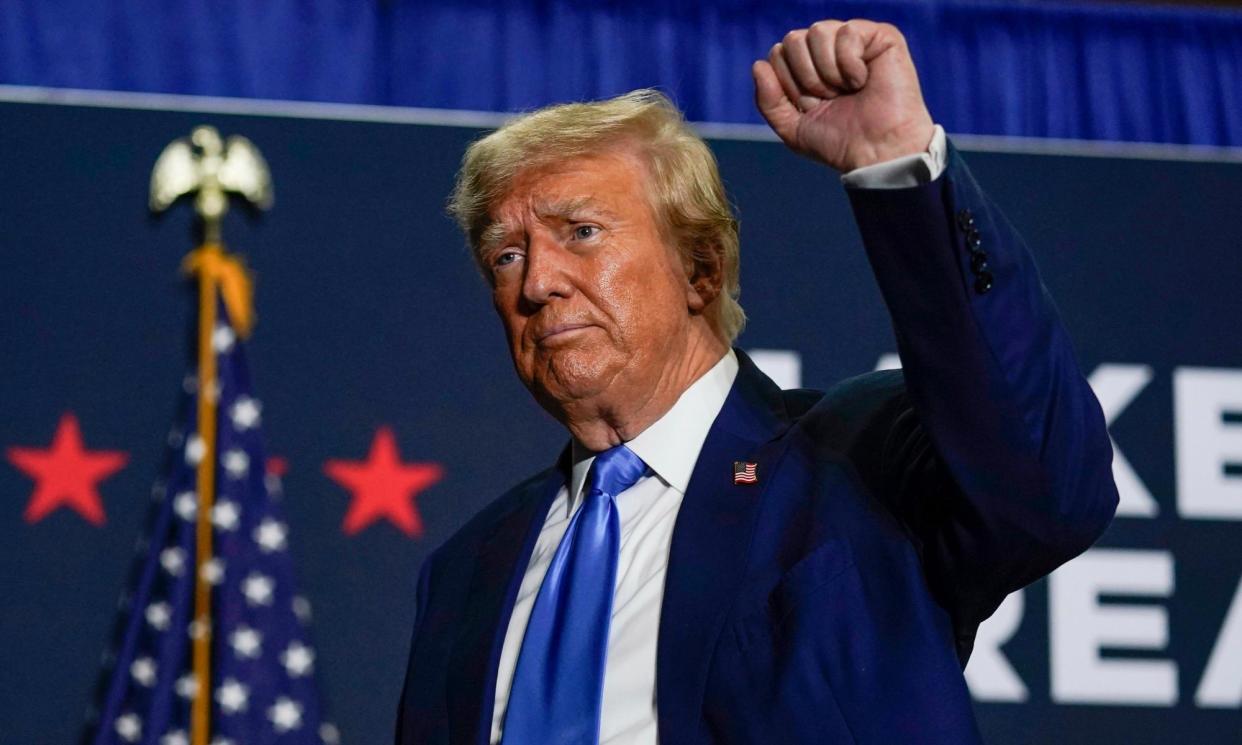A second Trump term will be far more autocratic than the first. He’s telling us

The best predictor of future behavior is past behavior. Plenty of observers seem to think that’s all one needs to know as one beholds Donald Trump’s seemingly inevitable Republican nomination for president and possible second term. They assume that because it wasn’t fascism the first time, it cannot be fascism the second time; Trump is expected once more to be the bumbling, blustering buffoon, supervised by adults in the room.
This relaxed view ignores that, with today’s pioneers of autocracy, things tend to only get really bad when they enter office the second time. The difference with Trump is not that he would leave democracy intact; the difference is that figures like far-right Hungarian prime minister Viktor Orbán or Polish strongman Jarosław Kaczyński carefully hid their authoritarian plans. Trump, by contrast, is broadcasting everything in advance – and, if elected, will claim that he has a mandate to exact retribution and occupy the White House permanently.
Related: His debate with Gavin Newsom showed Ron DeSantis will never be president | Lloyd Green
One of the great illusions of the 1990s was not, contrary to conventional wisdom, the belief that history had ended. Rather, it was the notion that democracies make mistakes but that their leaders are uniquely capable of correcting and learning from them. By contrast, the thinking went, autocrats cannot face up to problems; dictatorships are destined to end like the Soviet Union ended in 1991.
Today, we should know better. Whether the likes of Orbán and Kaczyński always wanted to be autocrats is besides the point. The fact is that they, just like Trump, considered it deeply unfair that they had suffered election defeat (duly attributed to various enemies, from judges to hostile media outlets). When they came back to power, they had learned one thing for sure: not to waste political capital on culture wars, but to capture state institutions, ideally on day one, with the judiciary and the state bureaucracy as primary targets. For once you control the judges, you can go after the journalists, the teachers, and the academics, and forever wage culture war to your heart’s content.
Whether Trump personally has learned anything we can debate. But those around him evidently have. In 2025, they will not permit the “deep state” to frustrate the leader again; as a number of astute analysts have pointed out, there is a detailed scheme to replace perhaps up to 50,000 civil servants with political cronies, and bring the justice department under political control.
It is typical for authoritarian populists to hijack the bureaucracy in broad daylight, advancing the argument that only they represent what populists call “the real people” (Trump’s very words to his supporters on January 6). After all, who is the state there for? The people, of course. Hence, when populists take over the state, they claim it’s really the people themselves rightfully taking possession of what is theirs. Recall Trump’s inaugural address, when he claimed that “we are transferring power from Washington and giving it back to you, the people”. The people never got it back, of course, because of the supposed “deep state”; this time must be different.
The fact that the Heritage Foundation, a supposedly mainstream, sort-of-Reaganite conservative think tank, has taken the lead in working out a plan to destroy the US administrative state is symptomatic of the fact that plenty of Republicans outside the immediate Maga cult have not only made their peace with an election denier and insurrection promoter but would appear to be on board with threats Trump has spelled out in speech after speech: on Veterans Day, he promised to “root out the Communists, Marxists, Fascists, and Radical Left Thugs that live like vermin within the confines of our Country, lie, steal, and cheat on Elections, and will do anything possible, whether legally or illegally, to destroy America, and the American Dream.”
Other aspiring autocrats were probably also seething with resentment – but they carefully camouflaged their intentions as they prepared the path back to office. In 2010, Orbán could wait for power to fall into his lap, in light of the Hungarian center-left’s disastrous economic record and corruption scandals (which pale in comparison to what Orbán would end up doing in his kleptocratic system); he never announced that he sought to replace independent judges, destroy media pluralism, and pass a new constitution.
Trump is not hiding anything; nor does a figure like the Heritage president, who considers Hungary “not just a model for conservative statecraft, but the model”. Trump threatens that “either the deep state destroys America or we destroy the deep state”. Judges, journalists, anyone who didn’t do his bidding to steal the 2020 election, anyone in the Biden administration (communists!), anyone in foundations and universities declared by Trump acolyte JD Vance to be “cancers on American society” – all should realize that he means it, and that self-styled center-right figures are not disavowing him.
If Trump wins, he will claim that “the people” – for only his voters are the “real people” – democratically decided in favor of revenge and destruction.
Jan-Werner Müller is a professor of politics at Princeton University. He is also a Guardian US columnist

 Yahoo News
Yahoo News 
